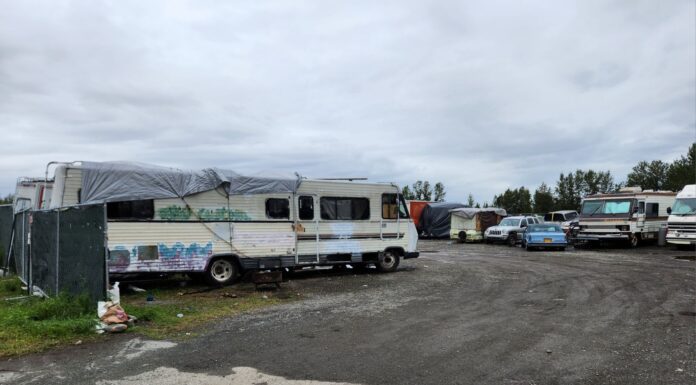Two major Supreme Court decisions were issued on Friday morning that impact Alaska.
In the first, the court ruled that the city of Grant Pass, Oregon (and others) can enforce a ban on public squatting on city properties, and that such bans do not constitute “cruel and unusual punishment.”
The court majority opinion, written by Justice Neil M. Gorsuch, said that the enforcement of laws regulating camping on public property is “commonplace” and not barred by the Eighth Amendment.
Gorsuch wrote that while homelessness is a complex issue, the city’s limited fines for first-time offenders, the ability to trespass repeat offenders from public parks, and a maximum of 30 days in jail for violators are punishments that don’t bring “terror, pain or disgrace.”
As is often the case, the three liberal women on the court dissented.
Justice Sonia Sotomayor called sleeping a “biological necessity, not a crime,” and wrote that for people with no homes, the city’s laws punish them for the status of being homeless. “That is unconscionable and unconstitutional,” she wrote. She was joined in her dissent by Justices Elena Kana and Ketanji Brown Jackson.
But the conservatives on the court cited an amicus brief from liberal California Gov. Gavin Newsom, and said that “policymakers need access to the full panoply of tools in the policy toolbox,” and need latitude to work through the complicated issues of homelessness.
The high court said that previous rulings by the Ninth Circuit Court of Appeals in a Boise, Idaho case and in the Grants Pass case, which had limited what municipalities could do in terms of banning public encampments on streets, parks, and sidewalks, may have actually increased the homelessness problem by taking away one important tool for cities that are responding to the growing crises in homelessness.
“In Portland, for example, residents report some unsheltered persons ‘often return within days’ of an encampment’s clearing,” Gorsuch wrote. And there wasn’t anything Portland could do about it, due to the Ninth Circuit ruling.
Anchorage had signed onto the lawsuit with several other cities in support of Grants Pass. That brief is at this link.
In a second case that impacts Alaska, the Supreme Court overturned what is known as the “Chevron doctrine.”
In a 1984 decision, Chevron v. Natural Resources Defense Council, the Supreme Court had said that courts should defer to an agency’s “reasonable interpretation of an ambiguous statute.” That gave license to bureaucrats to interpret laws their own way.
Now, in Loper Bright Enterprises v. Raimondo, the Supreme Court has held that courts may not grant those vast powers of interpretation to agencies, simply because a law is ambiguous.
Critics of that Chevron ruling say it gives unelected federal bureaucrats too much power in writing regulations. Regulatory overreach has stopped or slowed down projects in Alaska such as Willow and this ruling may even impact EPA decisions on Pebble Project and the Ambler Road to the proposed mining areas.
The case that ended up overturning Chevron Deference Doctrine involved a 2020 federal regulation that requires owners of fishing vessels in the Atlantic herring fishery to pay for federal onboard monitors while they’re at sea, which can cost more than $700 a day per vessel.
The National Marine Fisheries Service had created the rule under a 1976 law to force the cost of monitoring back on the fishing vessels. But the Alantic ishing fleet challenged the regulation, saying the fisheries service lacked the authority to mandate the industry to pay for the monitoring the NMFS was requiring.
“Chevron is overruled. Courts must exercise their independent judgment in deciding whether an agency has acted within its statutory authority, as the [Administrative Procedure Act] requires,” Chief Justice John Roberts wrote for the majority opinion, adding that the Chevron decision was a “judicial invention that required judges to disregard their statutory duties” to be the ones who interpret the laws passed by Congress or other jurisdictions.
The three liberal women justices — Sotomayor, Kagan, and Jackson — dissented in this ruling as well, siding with the Biden Administration, which asked the Supreme Court to leave Chevron deference intact. The Justice Department argued that the Chevron doctrine framework allows “experts” at federal agencies, who are more knowledgeable than judges, to interpret statutes.
